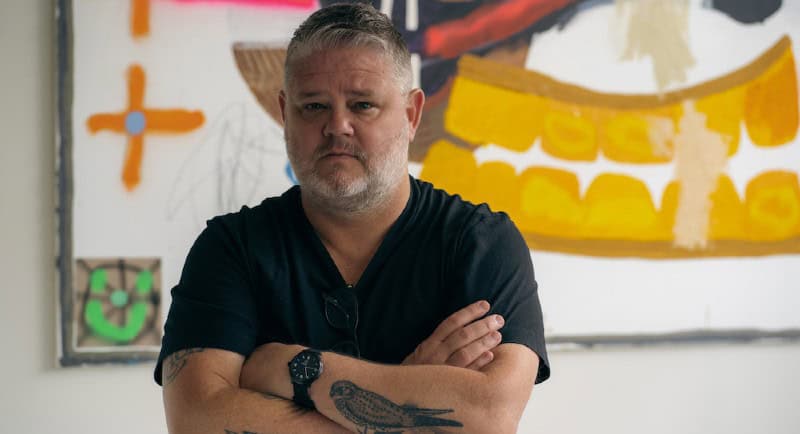Bear Meets Eagle on Fire’s creatives aren’t “quirky” or “eccentric”. They’re bloody good at their jobs.
“I find it quite patronising,” Micah Walker tells Mediaweek. Walker is the founder of the creative studio, which has, since its inception five years ago, been making waves in Australia’s ad industry through its distinctive work.
“I think there’s a kind of laziness sometimes in the way that people describe us where they go, ‘they’re wacky’, or ‘they’re zany’, which I really don’t like, in all honesty,” Walker admits.
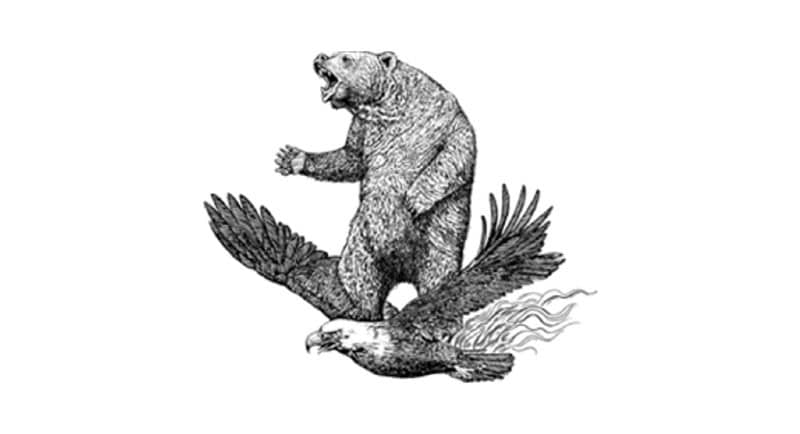
Already well-established through projects for ROLLiN car insurance and NRMA, Bear was catapulted to the top of the industry zeitgeist towards the end of last year, when it became a key piece of the +61 puzzle – the standalone agency built for Telstra, bringing together the Bear, TBWA and Telstra’s existing media agency, TBWA’s Omnicom stablemate, OMD. It’s now home to the biggest advertising account in Australia.
To Walker, the oversimplified descriptors of Bear’s work undermine its accomplishments. Ultimately, Bear stands out because its smart and highly considered work is deeply considerate in its response to a brief, he says.
“We would never make something just strange to make something strange. We would never make something funny just to be funny. I think it’s all connected to: What are we trying to solve? Who are we talking to?
“We try to do the right thing for a brand in surprising ways, and then really care hard about the detail and the craft and bring that to life.
“We don’t want a house style, we want to be able to do stuff that’s distinctive for whatever is appropriate for that particular problem.”
While Bear might not have a house style, the studio resolutely believes that “blending in is a choice.”
“We do fundamentally believe that you’re wasting a brand’s money if you’re not doing work that’s distinctive, and I think there’s real diligent, strategic foundations that we work through that unlock that distinctiveness. It’s not like we just sit around and go, ‘what would be cool?’”
From the very beginning, Walker wanted Bear to be a movement, and a force in brand creation.
“I’ve always said I want to work somewhere and I want to work on things where I’m allowed to care hard.”
The Bear Meets Eagle on Fire name was trademarked when Walker was first engaged to help create the sexual health brand, Smile Makers, with Swedish entrepreneurs 15 years ago, developing a range of vibrators from design through to packaging.
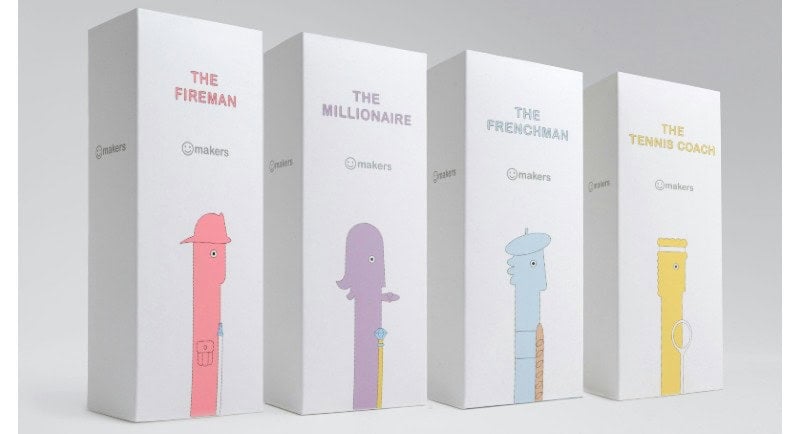
“The whole idea was that they would never be sold in sex shops, they were only going to exist in the health and beauty section.
“That was before the entire category went nuts.
“At the time, I remember it was really hard to get into even three or four markets, because it was so different. Now it’s a regular feature on Goop and they’re in like 111 markets.”
“We didn’t make a lot of money but, at its core, what was wonderful about it was that it was brand creation and design that informed everything from product design to packaging and positioning.”
It was a similar situation when, a few years after its official establishment in 2019, it launched ROLLiN Car Insurance. While not Bear’s first major work, it was a turning point. Industry interest piqued.
The great thing about ROLLiN, Walker says, “was that it was a project that was uniquely suited to us and that it was everything from naming the brands to creating the kind of strategic foundations for the brand to the brand design right through ultimately then to some advertising.
“We went through the process, working really closely with them on absolutely everything from the kinetic identity, straight through to the ethos and foundations for the brand. So super fun, and also very nice to get a brief to go, ‘we fundamentally want to do something that feels not like insurance advertising.’”
Nowadays, Walker believes brands often come to Bear when they have lost their way, dissolving into the background of their category.
“We’re at our best when we are at a stage with a brand, whether it be a new one or an old one, where a change of direction is essential for whatever reason,” he says.
Even for major national brands like Telstra, Walker says that “it’s our job to continue to push and try and match the ambition of what [it] can become.”
“It’s not like we have to fix it, it’s not like it’s a business in trouble or anything like that. But it is a brand that is capable of being more than it currently is. And that’s very exciting to us.”
As far as creative trust and respect goes, Walker has an enviable relationship with Telstra’s chief marketing officer, Brent Smart. Indeed, the ROLLiN project was the first task Smart ever entrusted to Bear.
“I take that burden very personally,” Walker says.
“You know, people often ask what drives you. And I say, ‘Everybody’s different. Some people want houses. I’m just always terrified to let someone down.’
“I’m very humbled by the trust and we’ll do everything we can to try and live up to the ambition that we know he has and that we have on behalf of Telstra.
“In our time together on ROLLiN, NRMA, and even Telstra, it’s always a very respectful exchange that does genuinely feel like partnership.”
+61 was first pitched to Smart as a solution that would grant him Bear’s creativity at scale, while allowing Bear to maintain its identity as a studio.
“Obviously a piece of business like that needs it, it needs infrastructure, and it needs scale to be able to do the amount of things that they do,” Walker explains.
“So we had this conversation about finding a unique solution that would allow Bear to be Bear and find a way to give Telstra the kind of scale and things that it needed.”
The bespoke agency allows Bear to work in synergy with TBWA, with whom they share a “sibling-like” relationship.
“It is unusual, I understand it’s probably confusing from the outside for some people. But I think that was part of what made it exciting,” he says.
“But it wasn’t built for efficiency. It wasn’t like, Bear will do brand and TBWA will do all the day to day stuff. It was built as a creative endeavour. The charge of +61 is a more integrated, elevated standard of work.”
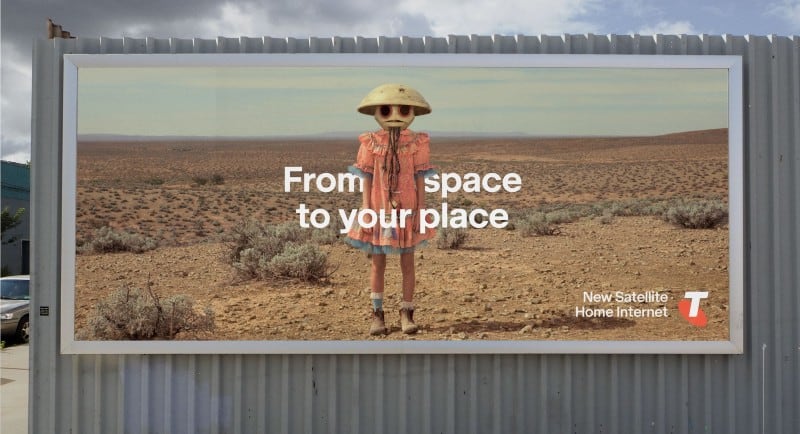
+61’s first work launched in April: an out of home campaign, From Space to Your Place, for Telstra’s satellite home internet. The second instalment of work, and first TVC, was dropped later that month: Pointless, a film directed by Finch’s Christopher Riggert.
Smart lauded the OOH: “I love how ambitious, yet simple this work is. And of course it’s beautifully crafted, like everything Micah and his team does. We are just getting started.”
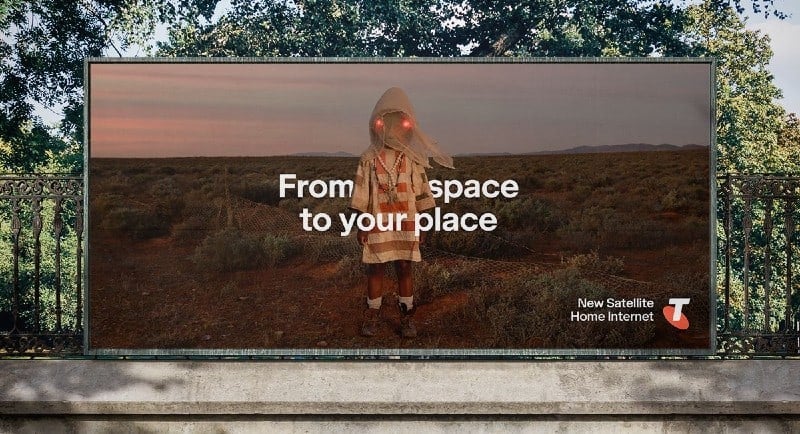
See also: First Telstra work from +61, From Space to Your Place, launches
The benchmark for Walker and his team is to create impactful work for ambitious brands, and to be curatorial about its projects.
“I do think the industry overall is in a funny place. The business model is a bit tricky,” Walker says.
“We’re fundamentally built differently. We’re elastic, not because of the market conditions, but by design.”
Walker sees the networks as largely sharing a similar problem: inefficiencies are partly translated into a markup on head hours, plus directional challenges that come from innumerable reporting lines.
“There’s a lot of waste in the traditional agency structure,” he says.
“What we wanted to design was something where you actually get more time off the people that are dedicated to your project. Like a production, there were times where we’ve been 18 people, and there are times where maybe, at our smallest, we were eight.
“We run very senior and very lean. We’re project-based, so we don’t actually tend to take on a lot of retained projects, and we’re output-based rather than head-hour based, so we don’t charge based on time.”
“Scale for us is in influence and potency, it’s not in headcount,” says Walker, who dismisses the usual “media conversation” which approximates headcount growth with business success.
“We’ve doubled revenue, we’ve been able to build that network in a way that helps us thrive without having 20 to 30 people.
“When your goal is not growth at all costs… and you’re not greedy, you can work in a way where we probably never have any more than about five or six clients.”
Walker says one of Bear’s enduring goals will be to maintain the balance between this structure and creative freedom, and the needs of clients.
“The beautiful thing about an independent is you can set the vision, you can set those principles and you can choose to try and be everything to everyone or you can choose to go well, ‘We don’t want to be everything. We want to do this.’
“For Bear, we never wanted to be everything to everyone, and we fundamentally did not want to be just an advertising agency. We wanted to be a creatively driven studio where our emphasis and what we were paid for wasn’t time.”
See also: First +61 film work for Telstra launches: ‘Pointless’
–
Top Image: Micah Walker
